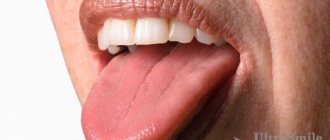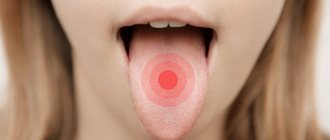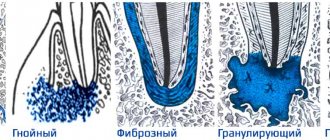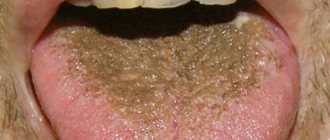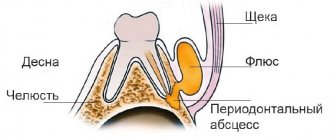Pain under the tongue can serve as one of the main symptoms of a whole range of problems, from banal mechanical injuries to a number of pathologies of the oral cavity, nervous system or internal organs. Depending on the cause and location of the pain, it can have a different nature and intensity.
If you or your loved one has pain under the tongue, there is no need to panic or self-medicate - this can only lead to aggravation of the situation. Contact a dentist at a dental clinic, he will conduct a diagnosis, determine the exact cause of the discomfort and prescribe an adequate treatment regimen to effectively eliminate the pain.
Causes
The causes of tongue pain can be very diverse, ranging from mechanical damage to the presence of cancer. Most often, pain occurs for the following reasons:
- presence of mechanical damage;
- development of inflammatory processes;
- various allergic reactions;
- development of neuralgia;
- the presence of hidden diseases of other organs of the human body;
- blockage of the salivary gland;
- presence of cancer.
The most common cause of pain on the tip or sides of the tongue is mechanical damage. Most often, the patient receives such injuries during eating, and they include biting, burns, scratches and cuts. The tongue can also be injured by chipped tooth enamel, an uncomfortable denture, or an unscrupulously installed filling with sharp edges. Constant, even minor injury can lead to long-term pain.
Inflammatory diseases of the oral cavity are dangerous and painful. If a patient has a sore tongue, throat, palate, and it hurts to swallow, the doctor has every reason to suspect the presence of inflammatory processes in the oral cavity. They can be caused by viral diseases of the nasopharynx, as a result of which the patient's sublingual lymph nodes become enlarged. In this case, the patient complains of pain when swallowing at the base of the tongue. With such symptoms, you should consult an otolaryngologist, since the cause of pain in the tongue may be acute purulent tonsillitis, which requires immediate medical treatment.
Another cause of pain is viral stomatitis. It affects both the surface of the tongue and the entire mucous membrane of the oral cavity. The disease is painful, causes difficulty in eating, and causes discomfort to the patient.
Often the causes of pain in the tongue lie in the presence of an allergic reaction in the patient. This could be an allergy to food or medications. Typically, the patient complains of tongue pain after eating, especially after kiwi, pineapple, seeds, drinking alcohol, and also after smoking a pipe and cigarettes.
Most often, an allergic reaction is expressed in the form of stomatitis or fungal diseases. Consumption of spicy food and alcohol only aggravates the painful condition. Discontinuation of those drugs and products that cause an allergic reaction leads to the disappearance of allergy symptoms.
Neuralgic diseases usually significantly complicate correct diagnosis; in this case, it is difficult to determine why the patient’s tongue hurts. The most common neuralgic disease is glossalgia. It occurs as a result of malfunctions of the endocrine system, as a result of neurogenic disorders, and also as a reaction to mental trauma or severe stress. With glossalgia, partial or complete numbness of the tongue, tingling, burning, and rapid fatigue of the tongue when speaking are observed. Often with glossalgia, the lips also hurt; the patient complains that he has a headache and a numb tongue.
Another reason for the appearance of pain in the tongue is the presence of hidden diseases of other organs and systems in the patient. The tongue reacts sharply to any changes in the condition of the body, and the result of infectious diseases of the body can be glossitis - inflammation of tissues.
Soreness can also be caused by diseases of the gastrointestinal tract, cardiovascular and endocrine systems, as well as the presence of anemia in the patient.
A blockage in the salivary gland, which is located near the tongue, can also lead to pain. In this case, the patient complains of pain under the tongue, constant discomfort and soreness of the oral cavity.
The most serious cause of tongue pain is cancer. In this case, patients complain of pain inside the tongue. In the early stages of cancer, there may be no pain at all; it usually appears in later stages. The treatment of oncological diseases is carried out by an oncologist, to whom both a general practitioner and a dentist can refer if there is a suspicion of oncological disease.
Swollen throat
If the tongue and throat are swollen at the same time, this condition is life-threatening for the patient. In the vast majority of cases, this condition occurs during anaphylactic shock (the most severe manifestation of allergies). Only an experienced doctor can remove a patient from a state of anaphylactic shock, therefore, at the first signs of swelling of the tongue and throat, you should immediately call an ambulance, especially if the patient has other dangerous symptoms - such as difficulty swallowing, bluish coloration of the lips and nails, swelling of the eyes and lips, small rashes, low blood pressure, nausea, shortness of breath or choking.
Pain after puncture
Recently it has become fashionable to pierce the tongue, it is called piercing. We will skip moralizing on this topic and tell you briefly what this threatens.
Many patients complain that their tongue hurts for a long time after the puncture. This is considered normal, since a puncture, even the most skillful one, is a kind of injury that takes time to heal. In addition, the tongue is literally riddled with nerve endings, so the puncture site hurts especially strongly. It is impossible to say exactly how long the pain continues after the puncture; this happens individually for everyone: for some, the pain stops 2-3 days after the puncture, for others the pain lasts for 10-12 days. If your tongue is swollen and painful immediately after the piercing, this is normal. However, severe pain and swelling should gradually subside and disappear completely 4-5 days after the puncture. If the pain does not subside after a week or is acute and throbbing, you should immediately consult a doctor, as the possibility of infection cannot be ruled out.
Causes of pain after piercing:
- damage resulting from puncture of nerve endings located in the tongue;
- infection in the wound and development of the inflammatory process;
- allergy to the metal from which the jewelry is made.
In order to prevent the development of complications, you should contact only professionals. After all, not every cosmetologist knows how to properly pierce the tongue without damaging the nerve or developing inflammatory processes. If, after the piercing, the pain when speaking and swallowing does not go away, you should consult a dentist or surgeon.
It should be warned that the closer to the edges of the tongue the puncture is made, the more painful and dangerous complications it is. The easiest way to heal is a puncture made in the center of the tongue, because along the edges of the tongue there are arteries, damage to which can even lead to death. How far from the tip the puncture is made also plays a role. The closer to the root the tongue is pierced, the more it swells and hurts.
- If after piercing your tongue hurts on the side, left or right, you should definitely consult a doctor to see if the lateral arteries are damaged or if they are being pressed by a barbell.
- If the patient is suffering from pain in the tip of the tongue, but it is not swollen and there are no signs of inflammation, such pain must be endured and the puncture site must be given time to heal.
- If the tongue was pierced in the root area, you should expect that the pain at the base will be prolonged, and the healing itself will take 4-6 weeks.
Stitching pain in the tongue after piercing should alert you, as they most often indicate the development of an acute inflammatory process due to infection. Without timely treatment, an abscess may develop.
Pain on the tip of the tongue
There may be several reasons for the occurrence of such pain:
- Mini tip injury . In first place in terms of prevalence are mini-injuries of the tip of the tongue. Most often, patients inadvertently bite the tip of their tongue or burn it with too hot food. Such mini-injuries are painful and cause a lot of trouble for patients; the papillae hurt, and sometimes eating becomes impossible for a while due to severe pain. Over time, everything heals and passes without a trace.
- Glossalgia is a serious disease in which the tip of the tongue most often hurts, less often its sides. The pain is manifested by a burning sensation; patients often complain that their tongue hurts, like after a burn. Sometimes the painful sensations spread to other organs of the oral cavity; the patient’s tongue and gums, sometimes lips and cheeks, hurt. If such symptoms are detected, you should immediately consult a doctor, since glossalgia is difficult to treat and exhausts the patient with its symptoms.
- Glossitis is an inflammatory disease of the tongue. When it occurs, the tip of the tongue can be very painful, because the infection that causes inflammation usually gets into the wound, and the tip of the tongue is bitten much more often than other parts of it.
- Stomatitis is also accompanied by severe pain in the tongue, which becomes covered with painful ulcers located over its entire surface.
- Allergy . Allergic reactions are also common causes of pain.
Our doctors
Debryansky Vladimir Alekseevich
Doctor - otorhinolaryngologist, doctor of the highest category
34 years of experience
Make an appointment
Zharova Galina Gennadievna
Doctor - otorhinolaryngologist, member of the European Society of Rhinologists, doctor of the highest category
40 years of experience
Make an appointment
Gogolev Vasily Gennadievich
Doctor - otorhinolaryngologist
20 years of experience
Make an appointment
Pain under the tongue at the base
Pain at the base of the tongue is a strong irritant for a person; it interferes with talking and eating, significantly worsening the patient’s quality of life. There are several causes of pain at the root:
- With glossalgia, pain can be localized both at the tip of the tongue and at its base, it all depends on the structural features of the patient’s tongue.
- With allergies, almost any part of the tongue can also hurt.
- Diseases of the gastrointestinal tract can provoke severe pain at the root of the tongue, which annoys the patient for a long time.
- With vitamin deficiency, patients complain of tingling and pain at the base.
- The most serious causes of soreness at the base of the tongue are cellulitis and abscess. Symptoms of these diseases are severe acute pain at the base of the tongue, the inability to close the mouth, bad breath, increased salivation, in which saliva constantly drips from the mouth. The patient's tongue swells, causing speech impairment and difficulty breathing. Both abscess and phlegmon are extremely dangerous diseases, so if you notice at least one of the above symptoms, you should immediately consult a doctor.
Swollen lips
As mentioned above, the tongue and lips most often swell at the same time due to allergies. In this case, swelling occurs rapidly, literally in a matter of minutes. Along with a swollen tongue, the patient may experience other unpleasant symptoms, such as a runny nose, sneezing, mild cough, vomiting and abdominal pain. If no measures are taken, then other symptoms may appear a little later - such as increased body temperature, changes in body color and sensitivity, and soreness and swelling of the tongue.
Many in this situation are lost and do not know what to do if the tongue is swollen and the patient apparently has an allergic reaction. You should not panic, you need to act quickly and clearly. You need to urgently call an ambulance, and before it arrives, give the patient an antihistamine, open the windows wide and provide access to fresh air, and avoid contact with the allergen (if known).
Soreness on the sides of the tongue
- If a patient complains of pain on the lateral surfaces of the tongue, the main reasons for their occurrence are most likely the same mechanical injuries, glossalgia or glossitis, allergic reactions and stomatitis. Often the tongue hurts on the sides due to poorly fitted dentures, which constantly injure the mucous membrane with its sharp edges.
- If the patient smokes a lot, this can also cause severe pain.
- If there is no apparent reason for the soreness of the tongue, and yet it hurts almost constantly, neuralgia should be suspected.
In any case, if your tongue is painful, you should consult a doctor; only he can make the correct diagnosis and prescribe appropriate treatment.
What to do and how to deal with pain?
First of all, you should contact one of the specialists dealing with oral diseases. This could be either a dentist or an otolaryngologist. Only a doctor can determine why the tongue hurts and what treatment needs to be prescribed.
Most often, patients are interested in what to do if the tip of the tongue hurts. First of all, you should rule out injury. If you bite or burn the tip of your tongue, you need to give the wound time to heal. As it heals, the pain will go away on its own. If the pain is caused by a piercing, you should follow all care recommendations, paying special attention to oral hygiene.
If your throat and white tongue hurt, it is most likely a sore throat or other upper respiratory tract disease. Inflammation of the tonsils is usually accompanied by severe pain at the base of the tongue, and if the left side hurts, it means that the left tonsil is more enlarged and inflamed and vice versa. If you notice redness of the throat, enlarged tonsils and submandibular lymph nodes, you should consult a therapist or otolaryngologist for treatment. After the sore throat goes away, the pain in the tongue will subside on its own.
If the tongue is very sore and the surface of the oral cavity is covered with a white cheesy coating and is inflamed, this is most likely candidal stomatitis. It is unlikely that you will be able to cope with the disease on your own, so you should contact a specialist for help.
The tongue may hurt after anesthesia, tooth extraction, and a visit to the dentist. This happens especially often if a back root tooth has been removed. At the same time, swelling of the gums, which is inevitable when a tooth is removed, can also affect the tongue area, causing its pain. Usually the discomfort goes away a few days after tooth extraction. If the pain persists longer, you should immediately contact the doctor who performed the tooth extraction.
